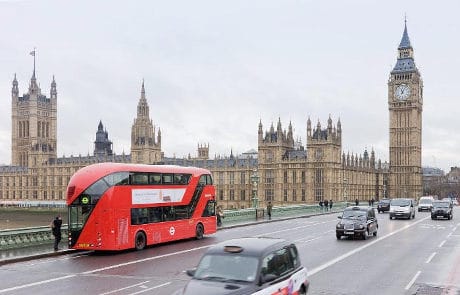
PARTNER NEWS: Commuters across London can now access real-time transport updates and contextually relevant advertising on their mobile phones through MyStop, a physical web service launched by mobile commerce provider Proxama with the support of Google and in partnership with out-of-home advertising provider Exterion Media.
The service uses Google’s Eddystone open beacon format and has initially gone live on the beacon network that Exterion Media installed on 500 London buses in July 2015. It is available to passengers who have the Chrome browser installed on their iPhone or Android handset, without requiring them to download a mobile app.
Travellers can use the service to see real-time route updates as well as to set reminder notifications as they approach their chosen stop.
Google began supporting the physical web in its Chrome browser in February 2015, enabling users to discover web content relevant to their surroundings via Eddystone Bluetooth Low Energy (BLE) beacons.
More details can be found in the press release:
Proxama partners with Google to deliver world’s first physical web experience for consumers
MyStop™ is live on Exterion Media’s London bus beacon network, utilising the latest version of Google Chrome
London, England – 9th March 2016: Proxama PLC (AIM: PROX), the leading mobile proximity marketing experts, has worked closely with Google to launch the world’s first deployment of a physical web consumer engagement experience. The campaign launches in London in partnership with Exterion Media, Europe’s largest privately held out-of-home (OOH) advertising business, via Google’s Eddystone open beacon format.
The MyStop™ web experience from Proxama delivers real-time transport updates to London commuters and travellers’ mobiles, as well as contextually relevant advertising. The service will be available to passengers with the Chrome browser installed on both iPhone and Android, initially across London buses. Passengers can use the service to see real-time route updates and status as well as set a reminder notification as they approach their chosen stop, according to their exact location on the bus route.
Brands will be able to use the beacon network to engage and advertise to London travellers, through the MyStop progressive web app service. London travellers are a highly sought after demographic – during ‘dwell time’, when they are most responsive to relevant and timely content. Bus travel in London accounts for more than half of all bus journeys in the UK with 2.36bn trips in the capital.
Eddystone boosts the reach and capability of beacon campaigns because it enables any smartphone with the Chrome browser to interact with the physical web without the need to download an app. With 47% of all handsets shipping with Chrome, this approach enhances the scale of campaigns significantly, and with it the potential to increase the return on investment on mobile advertising campaigns.
“Proxama has long seen the potential in beacons for delivering great consumer experiences via mobile. The ability to deliver contextually relevant messages and content to specific demographics has been the Holy Grail for brands for many years,” said Jon Worley, CEO of Proxama’s marketing division.
“We’ve partnered with Google to ensure our TapPoint® platform supports physical web experiences, meaning brands will no longer have to worry about whether a consumer is using this app or that device – just that they are connected to the internet. Through Proxama, brands are now deploying beacon enabled campaigns to large numbers of consumers rapidly and without technical complexity. We expect further roll outs in London and the UK over the coming months across transport networks and high footfall destinations such as shopping malls, stadiums, city centres and events.”
“It’s clear that Eddystone and the physical web creates exciting engagement opportunities for brands to better engage with consumers on the move. We have enhanced our bus beacon network to support Eddystone and we’re excited to see how brands take advantage of this. Along with our recent Fox and Shazam Kung Fu Panda 3 campaign announcement, this is yet another indicator that 2016 will be the year beacon technology gains significant market traction,” said Mike Wood, product strategy and innovation director, Exterion Media.
Google Chrome is the first web browser to support physical web notifications from Eddystone beacons with FireFox, Opera and Microsoft’s new Edge browsers expected to come on board imminently.
About Exterion Media
Exterion Media is Europe’s largest privately held out-of-home advertising business. Engaging consumers on the move and using wide-ranging insight tools, it delivers valuable, relevant audiences to advertisers. Its diverse inventory formats and environments, both classic and digital, include transport (London Underground, bus, rail) billboards, street furniture and retail. Exterion Media believes in making the everyday inspirational – by putting the right content, in front of the right people, at the right time and in the right location, Exterion Media transforms ordinary journeys into extraordinary experiences. With operations in the United Kingdom, Ireland, France, The Netherlands and Spain, Exterion Media works with a global portfolio of partners to engage and deliver audiences on a local and multi-country scale. Further information can be found online at: www.exterionmedia.com (Group) or www.exterionmedia.co.uk (UK) Twitter: @ExterionMediaUK LinkedIn: Exterion Media
About Proxama PLC
Proxama PLC (AIM: PROX) is the leading mobile proximity commerce company Proxama specialise in transport based mobile proximity services, using Bluetooth beacon-led technology, to deliver the most accurate and reliable mobile location and behavioural data for digital advertisers and agencies. Proxama’s award-winning mobile technology platform, TapPoint®, enables brands to connect physical and digital assets via mobile to increase consumer engagement, retail sales and loyalty, across transport networks and high footfall destinations such as shopping malls, stadiums, city centres and events.
Next: Visit the NFCW Expo to find new suppliers and solutions